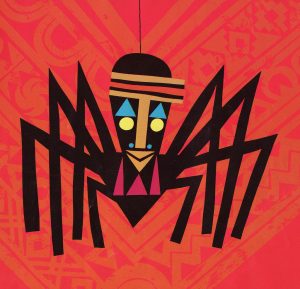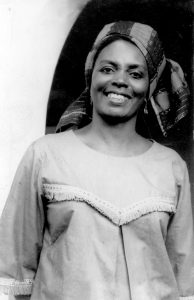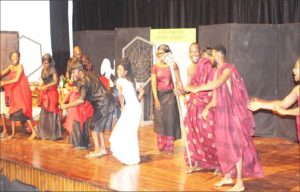“In Africa, performance is a primary arena for the production of knowledge. It is where philosophy is enacted and where multiple and often simultaneous discourses are employed.“
“In addition, performance is a means by which people reflect on their current condition, define or reinvent themselves and their social world and either re-enforce, resist or subvert the prevailing social order. Indeed both subversion and legitimation can emerge in the same utterance of act.”
-Margaret Thompson Drewal
Ghanaian Theater
West African culture is rich with traditions, customs and rituals which are deeply embedded in the way people live their lives. Many African countries are culturally unique and have histories that go back centuries. Ghana is no exception from these West African nations. Ghana’s rich history and deeply rooted traditions make Ghanaian culture, specifically Ghanaian theater, an impactful way in which Ghana has developed. The theater history of Ghana has influenced politics, art, and media in Ghana and has helped define Ghana as an independent nation after its history of Colonization by Britain.
Storytelling tradition
Ghana’s theater tradition began through the historical practice of storytelling. Storytellers, griots, were Ghana’s original playwrights. In a way they provided the foundation for what we see in African theater now. The griots duty was to retell history, genealogies, oral traditions of their people, sing praise songs and also to entertain the village with stories. The griots were not only living manifestations of archival information of their people, but they were also the way in which culture was bestowed to the people. The griots would gather villages after a hard days work on the farm, and pronounce and perform stories and retellings of tales under the light of the moon in the center of the village with no real set stage. Storytelling was often sung, spoken, dramaticized which made it much more than a simple travelers tale. The griots were the only performers, but these stories carried through Ghanaian tradition and were the building blocks for what was to come. They integrated socio-cultural subjects and themes, exposed human misdemeanours and encouraged community cohesion through periodic re-telling and enactments.
Anansi The Spider
Anansi The Spider is a famous Ghanaian folktale about a spider and his adventures and struggles and how he used his wit to outlast his ever-present problems. The origin of the Anansi character is of the Akan people of Ghana yet Anansi is one of the most popular African Folktale characters as his stories are used in multiple nations and tribes across West Africa. Furthermore, his story has been transferred to The Caribbean and African American folklore via the Atlantic Slave Trade, which is why Anansi the spider trickster tales share many similarities to other trickster tales told in the Western Hemisphere such as the African American folk character, Bra’er Rabbit.

Ghanaians relate heavily to Anansi and the folktales because of his trickster persona and his stories’ ability to relay messages to younger generations through proverbs and lessons. Ghanaians, as well as others in Africa and different parts of the world, can relate to the trickster character because of the characters defiance of oppression through wit. This is something directly related to the colonial history of not only Ghana but other African nations that were influenced and colonized by European powers.
The Anansi stories began as folktales told through the art of story-telling and plays. However, over time they became integrated into different Ghanaian art such as modern theater and media. Efua T. Sutherland became famous for her use of Anansi stories, Anansegoro, in her plays and in her work in Ghana’s experimental theater in the mid 20th century. Her famous play The Marriage of Anansewa which was developed off of a traditional Anansi story. Anansi tales’ influence on modern stories can has been so clearly linked to Ghanaian postcolonial art that it is seen to be synonymous with the National Theatre Tradition that Sutherland helped begin. Anansegoro is synonymous with the establishment of a national postcolonial theatre tradition.
- Anansesem= Anansi stories/words
- Anansegoro= Anansi play

Efua T. Sutherland (July 1924- Janurary 1996)
Efua T. Sutherland, “queen mother” of Ghanaian modern theater, was a very influential playwright, theater director, educator, poet, cultural and also child welfare activist, and children’s author in Ghanaian art. Educated in teaching at Saint Monica Teacher Training College and after some time teaching she went on to Homerton College in Cambridge and the School of Oriental and African Studies, specializing in drama, linguistics, and African languages. She created the Ghanaian Drama Studios in 1960 that ushered in an era of emphasis on Ghanaian culture and theater development, supported by the Ghanaian government, which was eager to find a more concrete identity after Ghana gained its independence from Britain. The Drama Studio signaled and epitomized Sutherland’s legacy in Ghana’s cultural history, summing up her conviction that theater is “a national anthem written in past and present rhythms with new lyrics.” She was the prime mover in the founding of the Ghana Society of Writers (1957). A year later, the Ghana Experimental Theatre Company was also launched under her. The theater architecture she designed for the studio is illustrative: the Courtyard Theatre merged two traditions, the ancient Ghanaian open-air theater in the king’s courtyard and the colonial-style covered theater. The theater evolved into a playwrights forum although it was initially intended as a workshop for children’s literature. Sutherland believed that theater is vital in creating a viable future for the country through its children. Sutherland encouraged bilingualism with bilingual plays like Vulture! Vulture! (1968) and Tahinta(1968) to ease the transition from students’ mother tongue into English, the language of instruction in schools. The theater flourished until 1990s when it was replaced by a new national theater.
Sutherland was also the creator of the Anansegoro story series (Anansi the spider based). She utilized these stories, with contemporary adaptations, to teach intricate social and ethical values to the youth of Ghana. The series broadcasted over radio and steadily accessible to different communities. Sutherland’s first play Foriwa was similarly focused on children as her many other works were.

Concert Party
Ghanaian concert party was an early 20th century performance. It was a popular theater tradition utilizing a variety of show material from Latin gramophone records, African American spirituals, and highlife songs. Concert party performances were eclectic combinations of dance, comedy, music, and drama. Actors doned minstrel make-up and performed various trickster roles, very similar to Anansi the spider, prominent in the Ghanaian culture. For much of the 20th century concert party was performed by traveling, marginalized, independent travel groups to mass audiences in rural areas. From early 1900s to 1930 the concert parties shifted their focus and become more centered around catering to traditional African art forms and away from European influences. They shifted from performing in English to more Ghanaian language and music, while the format was changed from a vaudeville-like structure to a traditional longer lasting play the went well into the night. Between the 1950s and 60s, the genre was developed to a format still used today that includes commercially successful productions. Larger casts replaced small trios, elaborate stories replaced sketches and British propaganda replaced Ghanaian cultural nationalism. One of Ghana’s most famous plays of this type is the Key Soap Concert Party. On December 31st, 2000 there was a scene of eruption over this play in the National Theater of Ghana. A standing room audience of 1,500 people became outrage over the production of the play, and the changing of the play in conjunction with recent very influential political changes and events in Ghana. The theater became a place of release of the tensions that had been built up in the people and the result was a subsequent upheaval in reaction to an altering of this popular play.
Citations
Adams, Anne V., and Esi Sutherland-Addy. The Legacy of Efua Sutherland: Pan-African Cultural Activism. Ayebia Clarke, Banbury, UK;Boulder, CO;, 2007.
Ajayi-Soyinka, Omofolabo. “Sutherland, Efua.” The Oxford Encyclopedia of Women in World History. : Oxford University Press, 2008. Oxford Reference. 2008. Date Accessed 19 Apr. 2018 <http://www.oxfordreference.com/view/10.1093/acref/9780195148909.001.0001/acref-9780195148909-e-1041>.
Asiedu Manu, Awo “Historical Overview of Theatre in Ghana” Theatre in Ghana, pp 1-29, Accessed 15 Apr, 2018. http://glomus.net/fileadmin/Documents/Theatre_in_Ghana.pdf
Boafo, Phillip. “Evolution of Ghana Theatre”. Academia. Accessed 15 Apr, 2018. http://www.academia.edu/3529582/Evolution_of_Ghanaian_Theatre
Cole, C.M.. Ghana’s Concert Party Theatre. Cultural Encyclopedia, 2001. http://www.culturalencyclopaedia.org/ghana-s-concert-party-theatre-book. Accessed 14 Apr, 2018
Dor, George Worlasi Kwasi. “Ephraim Amu’s” Bonwere Kenteŋwene”: a celebration of Ghanaian traditional knowledge, wisdom, and artistry.” African Music: Journal of the International Library of African Music 9.4 (2014): 7-35.
“Folktale: Anansi Tries to Steal All the Wisdom in the World read by Nick Cannon.” Youtube, Uploaded by Homer, 21 January 2009, https://www.youtube.com/watch?v=zG9eknk6mqw
Kwekudee. “TRIP DOWN MEMORY LANE.” EFUA T SUTHERLAND: AFRICA`S FEMALE PIONEER DRAMATIST, CULTURAL VISIONARY AND ACTIVIST AND “BLACK AFRICA`S MOST FAMOUS WOMAN WRITER”, Blogger, 3 Oct. 2014, kwekudee-tripdownmemorylane.blogspot.com/2014/10/efua-t-sutherland-africas-female.html.
“Marriage of Anasewa” Youtube, by Uploaded by spartsug, 18 December, 2012, https://www.youtube.com/watch?v=Snz9s7qFTEU
Shipley, Jesse Weaver. Trickster Theatre: the poetics of freedom in urban Africa. Indiana University Press, 2015.
Ukaegbu, Victor. “Anansegoro: modern storytelling as narrative trope in contemporary Ghanaian literary theatre.” (2010): 246-265.